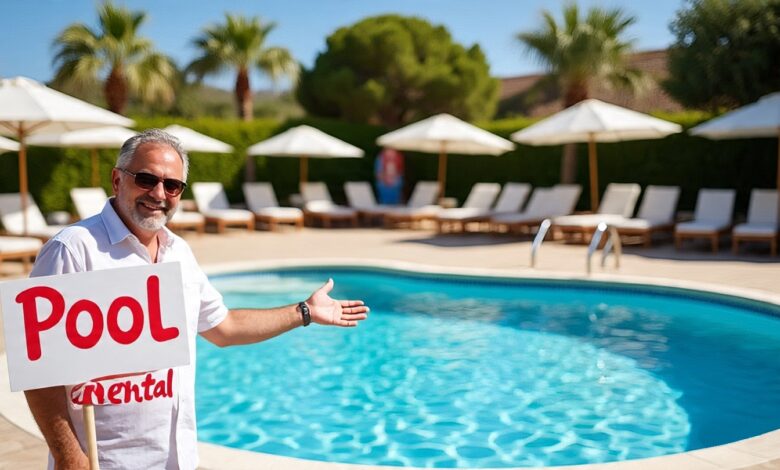
Spain’s scorching summers and limited public pool access have created a unique opportunity for pool owners to generate significant extra income by renting out their swimming pools. With temperatures regularly exceeding 35°C across the country, demand for private pool access has skyrocketed, particularly since 2020 when pool rentals became increasingly popular following the pandemic.
The concept is simple yet profitable: homeowners with underutilized swimming pools can transform their backyard oasis into a revenue-generating asset. Unlike traditional property rentals, pool rental allows you to maintain use of your home while monetizing your outdoor space during peak demand periods. This sharing economy model has proven exceptionally successful in Spain, where over one million private swimming pools exist across the country.
Pool rental platforms like Swimmy and international services such as Swimply have established Spain as a key market for this emerging business model. These platforms facilitate connections between pool owners seeking to generate rental income and guests desperate to escape the Mediterranean heat. The earning potential is substantial – successful hosts can generate anywhere from €50 to €200 per hour, with prime locations and well-maintained facilities commanding premium rates.
However, renting your pool in Spain involves navigating specific legal requirements, tax obligations, and regional regulations that vary significantly across autonomous communities. From understanding VAT implications for commercial activities to ensuring proper insurance coverage, pool owners must address several considerations before launching their pool rental business.
This comprehensive guide will walk you through every aspect of how to rent your swimming pool in Spain, from selecting the right platform and setting competitive rates to managing legal compliance and maximizing your earning potential. Whether you own a modest family pool in Valencia or a luxury infinity pool on the Costa del Sol, this guide provides the essential knowledge needed to successfully monetize your aquatic asset while operating within Spain’s regulatory framework.
Understanding the Spanish Pool Rental Market
Market Demand and Opportunities
Spain’s pool rental market has experienced explosive growth, driven by the country’s intense summer heat and surprisingly limited public pool infrastructure. Unlike many European nations, Spain lacks extensive outdoor public swimming facilities, with most pools requiring gym memberships or charging high daily access fees. This scarcity creates exceptional demand for private pool access, particularly during the peak summer months of June through September.
The sharing economy phenomenon has revolutionized how Spanish property owners view their assets. Pool rental represents a natural evolution of platforms like Airbnb, allowing homeowners to monetize specific amenities rather than entire properties. This model is particularly attractive in Spain, where many pool owners find their facilities underutilized during work days or when traveling.
Regional demand varies significantly across Spain. Coastal areas like the Costa del Sol, Costa Brava, and Costa Blanca experience year-round demand due to tourist populations, while inland cities such as Madrid, Seville, and Córdoba see intense seasonal spikes during summer months when temperatures can exceed 40°C.
Target Demographics
- Pool rental guests in Spain typically fall into several distinct categories:
- Families with Children represent the largest segment, seeking safe, private environments for recreational swimming without crowded public facilities. These guests often book longer sessions and are willing to pay premium rates for child-friendly amenities.
- Young Professionals and Groups frequently rent pools for social gatherings, celebrations, and weekend relaxation. This demographic tends to book evening sessions and values Instagram-worthy settings with modern amenities.
- Tourists and Vacation Rental Guests staying in accommodations without pool access represent a significant market, particularly in major tourist destinations. These users often make spontaneous bookings and are less price-sensitive.
- Health and Fitness Enthusiasts seek pools for regular exercise routines, representing potential recurring customers willing to establish longer-term arrangements.
Seasonal Patterns and Pricing Dynamics
Spain’s pool rental market exhibits strong seasonal patterns directly correlated with temperature and daylight hours. Peak season typically runs from May through October, with July and August commanding the highest rates. During these months, successful pool owners can achieve occupancy rates exceeding 60% with hourly rates ranging from €75 to €250.
Spring and early autumn (April-May and September-October) represent shoulder seasons with moderate demand and pricing typically 20-30% below peak rates. Winter months see minimal activity except in southern regions with heated pools or covered facilities.
Daily demand patterns also favor afternoon and evening bookings, with 2 PM to 8 PM representing prime time slots. Weekend bookings consistently command 25-40% premiums over weekday rates.
Legal Requirements and Regulations
Licensing and Permits
Renting your swimming pool in Spain exists in a complex legal gray area that varies significantly by autonomous community and municipality. While short-term pool rental doesn’t typically require the same licenses as tourist accommodations, pool owners must carefully navigate local regulations to ensure compliance.
Tourist License Requirements apply in certain regions when pool rental is combined with additional services. Catalonia and the Balearic Islands have strict regulations requiring tourist licenses for any commercial use of residential properties, including pool rentals that include amenities like towel service, food, or beverages.
Commercial Activity Classification represents a critical consideration. If pool rental becomes a regular, profitable activity, local authorities may classify it as a commercial enterprise requiring a business license and potentially triggering zoning restrictions. Most municipalities have specific thresholds for commercial activity, typically based on frequency of use or annual income generated.
Community Permission is essential for pool owners in residential complexes or urbanizations. Most community bylaws require approval from the homeowners’ association before engaging in any commercial activity. This typically involves presenting your pool rental proposal at an AGM or EGM and securing majority approval.
Insurance and Liability Considerations
Insurance coverage represents perhaps the most critical aspect of pool rental operations. Standard homeowner’s insurance policies typically exclude coverage for commercial activities, creating significant liability exposure for pool owners.
Commercial Liability Insurance is essential for serious pool rental operations. Policies should provide minimum coverage of €300,000 for personal injury and property damage, with higher limits recommended for premium operations. Some international pool rental platforms provide basic liability coverage, but this rarely meets Spanish legal requirements.
Pool Safety Compliance requires adherence to Spanish safety standards, including proper fencing, non-slip surfaces, and safety equipment availability. Pool owners should ensure compliance with Real Decreto 742/2013, which establishes safety requirements for swimming pools.
Guest Screening and Rules help minimize liability exposure. Successful pool owners establish clear rules regarding alcohol consumption, maximum occupancy, children supervision requirements, and prohibited activities.
Regional Variations
Spain’s autonomous communities have varying approaches to pool rental regulation:
Catalonia has the strictest requirements, with Barcelona specifically limiting short-term commercial activities in residential areas. Pool owners may need tourist licenses for regular rental income generation.
Andalusia takes a more permissive approach but requires proper tax registration for any rental income. Municipalities may impose specific restrictions on commercial activities in residential zones.
Madrid Community has minimal specific regulations for pool rental but enforces general commercial activity rules. Pool owners should verify local municipal requirements.
Valencia Community allows pool rental under existing accommodation regulations but requires proper insurance and tax compliance.
Choosing the Right Platform
Swimmy: The European Leader
Swimmy has established itself as the leading pool rental platform in Spain since launching in 2019. Originally founded in France, the platform specifically targets the European market with features tailored to local regulations and cultural preferences.
Registration Process on Swimmy is straightforward and free for both pool owners and guests. The platform requires detailed property information, including pool dimensions, amenities available, access arrangements, and house rules. Pool owners must provide high-quality photos showcasing their pool and surrounding area.
Commission Structure is competitive, with Swimmy charging approximately 15% of each booking value. This fee covers payment processing, customer support, and basic liability coverage. The platform handles all payment transactions, providing security for both parties.
Target Market focuses primarily on European users, making it ideal for pool owners in tourist-heavy regions. The platform’s French origins provide particular strength in markets with significant French tourist populations.
International Platforms
Swimply represents the global leader in pool rental, with over 15,000 listings across multiple countries. While primarily focused on North American markets, the platform has been expanding European operations and may offer opportunities for Spanish pool owners targeting international guests.
Peerspace offers a broader marketplace for unique spaces, including pools, and caters to event planners, photographers, and content creators. This platform can command higher hourly rates but typically serves a more specialized market.
Local Platforms are emerging across Spain, often operated by regional tourism companies or startup ventures. These platforms may offer lower commission rates but typically have smaller user bases.
Platform Selection Criteria
Commission Rates vary significantly between platforms, ranging from 10% to 20% of booking value. Pool owners should calculate net income after commissions when comparing options.
User Base Size directly impacts booking potential. Established platforms with larger user bases typically generate more inquiries and bookings, justifying higher commission rates.
Payment Security is crucial for protecting both pool owners and guests. Reputable platforms handle all payment processing and provide dispute resolution services.
Insurance Coverage varies by platform. Some provide basic liability coverage, while others require pool owners to maintain independent insurance policies.
Support Services can make significant differences in operational efficiency. Quality platforms offer customer support, booking management tools, and marketing assistance.
Setting Up Your Pool for Rental
Pool Preparation and Maintenance
Pool maintenance standards for rental income generation far exceed typical residential requirements. Pool owners must maintain pristine water quality, optimal temperature, and impeccable cleanliness to ensure positive guest reviews and repeat bookings.
Water Quality Management requires professional-grade testing and chemical balancing. Pool owners should invest in digital testing equipment to monitor pH, chlorine levels, and alkalinity multiple times daily during peak season. Professional pool service contracts ensure consistent water quality and can provide documentation for insurance purposes.
Safety Equipment must meet or exceed Spanish safety standards. Essential equipment includes life rings, reaching poles, first aid kits, and emergency contact information prominently displayed. Pool owners should consider installing additional safety features like pool alarms or security cameras (with appropriate privacy considerations).
Cleanliness Standards demand meticulous attention to detail. Pool owners should implement rigorous cleaning protocols between bookings, including skimming, vacuuming, testing water chemistry, and sanitizing all surfaces and equipment.
Amenities and Value-Added Services
Enhanced Amenities can significantly increase rental income and booking frequency. Popular additions include:
Poolside Furniture should be comfortable, weather-resistant, and sufficient for your maximum guest capacity. Quality lounge chairs, umbrellas, and dining sets create attractive booking environments.
Entertainment Systems like waterproof speakers, Wi-Fi access, and outdoor lighting extend usable hours and appeal to social groups. Smart lighting systems can create ambiance for evening bookings.
Food and Beverage Options require careful consideration of licensing requirements. Simple additions like a mini-fridge stocked with beverages or BBQ facilities can command premium rates but may trigger commercial activity classifications.
Changing Facilities greatly enhance guest convenience. Even basic changing rooms with mirrors and hooks significantly improve the guest experience and can justify higher hourly rates.
Photography and Marketing
Professional Photography represents the most important investment in your pool rental success. High-quality images drive booking decisions and can increase your rates by 30-50%. Essential shots include wide-angle pool views, detail shots of amenities, and atmospheric evening lighting.
Listing Optimization requires compelling descriptions highlighting unique features, nearby attractions, and guest benefits. Successful listings emphasize privacy, cleanliness, and convenience while clearly stating house rules and expectations.
Seasonal Marketing should adapt to changing demand patterns. Summer marketing emphasizes cooling off and relaxation, while shoulder seasons might focus on exercise, therapy, or intimate gatherings.
Pricing Strategies and Revenue Optimization
Market Rate Analysis
Pricing research forms the foundation of successful pool rental operations. Pool owners should analyze comparable properties within a 10-kilometer radius, considering factors like pool size, amenities, location desirability, and seasonal demand patterns.
Hourly Rates in Spain typically range from €45-€75 for basic residential pools to €150-€250 for luxury properties with extensive amenities. Prime locations near beaches or tourist attractions can command premium rates, while inland locations may require competitive pricing to attract bookings.
Dynamic Pricing strategies can maximize rental income by adjusting rates based on demand, weather forecasts, local events, and booking timing. Weekend rates should be 25-40% higher than weekday pricing, while last-minute bookings can command premium rates during high-demand periods.
Revenue Maximization Techniques
Minimum Booking Requirements help optimize rental income while reducing operational overhead. Most successful pool owners implement 2-3 hour minimum bookings during peak seasons, with flexibility during off-peak periods to maintain occupancy.
Package Deals can increase average booking values and guest satisfaction. Popular packages include extended sessions with food/beverage service, birthday party packages with decorations, or fitness packages with aqua exercise equipment.
Repeat Customer Programs generate stable rental income and reduce marketing costs. Loyalty discounts, seasonal passes, or regular booking arrangements with fitness enthusiasts create predictable revenue streams.
Upselling Opportunities include heated pool service, premium amenities, extended hours, or additional services like towel rental or poolside catering. These additions can increase booking values by 20-50%.
Seasonal Adjustment Strategies
Peak Season Optimization focuses on maximizing rates and occupancy during July-August when demand exceeds supply. Pool owners can implement surge pricing during heatwaves or local festivals while maintaining consistent service quality.
Shoulder Season Strategies require creative marketing and flexible pricing to maintain occupancy during spring and autumn months. Targeting local fitness groups, photography sessions, or off-season tourists can sustain rental income.
Off-Season Operations in southern Spain can generate year-round revenue with heated pools and covered areas. Marketing to health-conscious locals, rehabilitation therapy, or winter tourist populations can provide surprising income during traditionally slow periods.
Tax Obligations and Financial Considerations
Spanish Tax Requirements
Rental income from pool rental operations is subject to Spanish taxation regardless of your residency status. Pool owners must understand their obligations under both national tax law and regional variations that can significantly impact net profitability.
Resident Taxation treats pool rental income as part of your annual income tax return (IRPF). Rates range from 19% to 47% depending on total income levels, with most pool owners falling into the 24-30% bracket. Long-term rental income may qualify for up to 60% tax reduction, but short-term pool rentals typically don’t qualify for these benefits.
Non-Resident Taxation applies flat rates of 19% for EU/EEA residents and 24% for non-EU residents on gross rental income. However, EU residents can deduct proportional expenses, potentially reducing taxable income significantly.
VAT Obligations may apply if pool rental activities are classified as commercial services. When additional services like food, towels, or cleaning are provided, pool owners may need to register for VAT and charge 10% on all bookings.
Deductible Expenses
Pool owners can reduce taxable rental income through legitimate business expense deductions:
Maintenance Costs including chemicals, cleaning supplies, equipment repairs, and professional pool service contracts are fully deductible when proportioned to rental usage periods.
Utility Expenses for water, electricity, and heating can be deducted proportionally based on rental days versus total annual usage. Heated pools may have substantial electricity deductions.
Insurance Premiums for commercial liability coverage are fully deductible business expenses, as are any additional safety equipment purchases required for rental operations.
Platform Commissions and payment processing fees are deductible business expenses, as are marketing costs, professional photography, and equipment purchases specifically for rental operations.
Property Improvements related to rental operations may qualify for depreciation deductions, though major additions like new pools or cabanas have specific depreciation schedules.
Record Keeping Requirements
Documentation Standards require meticulous record keeping for all rental income and expenses. Spanish tax authorities expect detailed records including booking confirmations, payment receipts, expense invoices, and maintenance logs.
Quarterly Reporting may be required for substantial pool rental operations generating significant income. Pool owners should consult tax professionals to determine reporting frequency based on income levels.
Professional Assistance is highly recommended for pool owners generating substantial rental income. Spanish tax law is complex, and professional guidance can optimize deductions while ensuring compliance with all obligations.
Marketing and Guest Management
Attracting Quality Guests
Target Market Identification enables pool owners to focus marketing efforts on ideal guest profiles. Families with children require different amenities and messaging than young professionals seeking party venues or fitness enthusiasts needing exercise facilities.
Online Presence Optimization extends beyond platform listings to include social media profiles, Google My Business listings, and potentially dedicated websites for premium operations. Consistent branding and professional imagery across all channels builds credibility and attracts quality bookings.
Review Management directly impacts booking success, with most guests reading reviews before making reservations. Pool owners should actively encourage positive reviews, promptly address concerns, and maintain ratings above 4.5 stars for optimal platform visibility.
Local Partnerships can generate steady booking streams. Relationships with nearby vacation rental managers, hotels without pools, event planners, and fitness instructors can create referral opportunities and regular bookings.
Guest Experience Excellence
Communication Standards should be professional, prompt, and informative. Successful pool owners respond to inquiries within 2-4 hours and provide detailed pre-arrival information including directions, parking instructions, and house rules.
Check-in Processes should be seamless and welcoming. Clear arrival instructions, easy property access, and brief orientation to facilities and safety equipment create positive first impressions that influence reviews and repeat bookings.
During-Stay Support includes availability for questions or issues, though most pool rentals operate with minimal host interaction. Emergency contact information should be readily available for urgent situations.
Check-out Procedures should be simple and clearly communicated. Basic expectations like equipment storage, trash disposal, and departure timing should be established upfront to avoid conflicts.
Building Repeat Business
Customer Relationship Management involves maintaining contact with satisfied guests through periodic communications about seasonal availability, special offers, or facility improvements. Email lists of past guests represent valuable marketing assets.
Loyalty Programs can encourage repeat bookings through discounts, priority booking access, or enhanced amenities for frequent guests. Simple programs offering every 5th booking at reduced rates can significantly impact annual revenue.
Referral Incentives leverage satisfied guests to attract new customers. Offering booking credits or discounts for successful referrals creates organic marketing that often generates high-quality guests.
Managing Risks and Challenges
Safety and Security Considerations
Risk Assessment should identify potential hazards specific to your property and pool rental operations. Common risks include slip-and-fall accidents, drowning incidents, property damage, and security concerns with unknown guests accessing your property.
Safety Protocols must be clearly established and communicated to all guests. Essential protocols include maximum occupancy limits, child supervision requirements, alcohol consumption rules, and emergency procedures. Posted safety rules and contact information are legal requirements in most Spanish jurisdictions.
Security Measures protect both your property and guest safety. Consider security cameras in common areas (not pool areas for privacy), secure storage for valuable items, and clear boundaries for guest access areas. Smart locks can provide secure access without key exchange requirements.
Emergency Preparedness requires established procedures for medical emergencies, property damage, or security incidents. Pool owners should maintain relationships with local emergency services, have emergency contact lists readily available, and understand their legal obligations for incident reporting.
Insurance and Liability Management
Comprehensive Coverage requires policies specifically designed for pool rental operations. Standard homeowner’s insurance typically excludes commercial activities, leaving pool owners exposed to significant liability risks.
Policy Requirements should include minimum €500,000 liability coverage for personal injury and property damage, with higher limits recommended for premium operations. Coverage should specifically include commercial pool operations and guest activities.
Claims Management requires understanding your policy terms, proper incident documentation, and prompt insurer notification. Maintaining detailed guest information and signed waivers can support insurance claims and reduce liability exposure.
Risk Mitigation strategies include thorough guest screening, clear house rules, proper safety equipment, and regular property maintenance. Professional risk assessments can identify potential hazures before incidents occur.
Dealing with Difficult Situations
Problem Guest Management requires diplomatic but firm enforcement of house rules. Common issues include overcrowding, excessive noise, property damage, and violation of safety rules. Clear consequences should be established and communicated upfront.
Cancellation Policies should balance flexibility with revenue protection. Weather-related cancellations are common in Spain, and fair policies build goodwill while protecting against frivolous cancellations.
Dispute Resolution may involve platform mediation services, direct negotiation, or legal action for serious violations. Documentation of all communications and incidents is essential for successful dispute resolution.
Community Relations can be impacted by pool rental operations. Proactive communication with neighbors, reasonable operating hours, and prompt addressing of complaints help maintain positive relationships and avoid regulatory issues.
Success Stories and Best Practices
Case Study: Madrid Suburban Success
Location Analysis: A family in Madrid’s northern suburbs transformed their underutilized 8x4m pool into a €15,000 annual income source. The property’s proximity to the city center and lack of nearby public pools created strong demand despite the residential location.
Investment Strategy: Initial improvements totaled €3,500, including professional photography (€300), enhanced poolside furniture (€1,200), safety equipment upgrades (€500), and liability insurance (€800 annually). The investment payback period was just 4 months.
Operational Approach: The family implemented a systematic approach with 3-hour minimum bookings, dynamic pricing based on weather and demand, and comprehensive guest screening. They maintained 65% occupancy during peak season (May-September) and 25% during off-season.
Revenue Results: Year one generated €12,400 in gross revenue with €8,700 net after expenses and taxes. Year two increased to €15,200 gross revenue as their 4.9-star rating and strong reviews increased booking frequency and allowed premium pricing.
Case Study: Costa del Sol Luxury Operation
Premium Positioning: A luxury villa owner in Marbella leveraged their infinity pool and panoramic sea views to create a high-end pool rental experience commanding €200-€300 per hour during peak season.
Service Enhancement: The operation included premium amenities like poolside service, premium towels, refrigerated beverages, and a dedicated changing area with high-end amenities. Professional photography and videography showcased the stunning location.
Marketing Strategy: Targeted marketing focused on social media influencers, photographers, and high-end tourists through partnerships with luxury hotels and concierge services. The emphasis was on exclusivity and Instagram-worthy experiences.
Financial Performance: Despite higher operational costs (€25,000 annually including staff, amenities, and enhanced insurance), the operation generated €45,000 in gross revenue with €28,000 net profit in its second year of operation.
Best Practices Summary
Professional Approach distinguishes successful pool rental operations from casual arrangements. Treating the activity as a business with proper planning, documentation, and guest service consistently generates better results.
Continuous Improvement based on guest feedback, market analysis, and seasonal performance helps optimize operations over time. Successful pool owners regularly upgrade amenities, adjust pricing, and enhance guest experiences.
Community Integration ensures long-term sustainability by maintaining positive relationships with neighbors, local authorities, and community associations. Proactive communication and responsible operations prevent regulatory issues.
Financial Discipline requires careful expense tracking, tax compliance, and reinvestment in property improvements. Successful operations balance guest experience investments with profitability goals.
Technology and Tools for Pool Rental Management
Booking Management Systems
Platform Integration across multiple pool rental platforms requires sophisticated management tools to prevent double bookings and optimize occupancy. Professional pool owners often use synchronized calendar systems that update availability across all platforms simultaneously.
Automated Communication tools can handle routine guest communications including booking confirmations, pre-arrival instructions, and post-stay review requests. These systems save significant time while ensuring consistent, professional communication with all guests.
Dynamic Pricing Software analyzes local demand patterns, weather forecasts, and competitor pricing to optimize hourly rates automatically. Advanced systems can increase revenue by 15-25% through data-driven pricing decisions.
Guest Screening Tools help identify potentially problematic bookings through automated analysis of guest profiles, review histories, and booking patterns. This technology reduces risk while maintaining high guest quality standards.
Property Management Technology
Smart Access Systems eliminate key exchange requirements through keypad locks, smart locks, or temporary access codes. These systems enhance guest convenience while maintaining security and reducing operational overhead.
Pool Monitoring Technology includes automated chemical testing systems, temperature monitoring, and filtration management. Smart pool systems can maintain optimal conditions with minimal manual intervention while providing documentation for guest safety.
Security and Safety Technology ranges from security cameras in common areas to pool alarms and emergency communication systems. Modern technology can enhance safety while providing liability protection through incident documentation.
Revenue Tracking Software specifically designed for rental income operations helps manage bookings, track expenses, and prepare tax documentation. Integrated systems can connect with accounting software to streamline financial management.
Marketing and Guest Experience Technology
Professional Photography Tools including drone photography, virtual tours, and 360-degree imaging can significantly enhance listing appeal and booking rates. High-quality visual content remains the most important factor in booking decisions.
Social Media Management tools help maintain consistent online presence across multiple platforms, schedule posts, and engage with potential guests. Effective social media marketing can generate direct bookings that avoid platform commission fees.
Review Management Systems monitor reviews across all platforms and send automated requests to satisfied guests. Maintaining high review ratings is essential for platform visibility and booking success.
Guest Experience Apps can provide information about local attractions, restaurant recommendations, and property amenities. These tools enhance guest satisfaction while reducing host communication requirements.
Future Trends and Opportunities
Market Evolution Predictions
Platform Consolidation is likely as the pool rental market matures, with larger platforms acquiring smaller competitors and expanding service offerings. Pool owners should diversify across multiple platforms while building direct booking capabilities.
Service Integration will expand beyond simple pool access to include comprehensive experience packages. Future offerings may include catering, event planning, photography services, and wellness programs integrated into pool rental operations.
Regulatory Development is inevitable as pool rental operations become more common and generate larger revenues. Pool owners should stay informed about evolving regulations and maintain flexibility to adapt to new requirements.
Technology Integration will continue advancing with IoT pool management, AI-powered pricing optimization, and virtual reality marketing tools becoming standard for professional operations.
Expansion Opportunities
Multi-Property Operations represent natural growth for successful pool owners. Managing multiple properties or partnering with other pool owners can create economies of scale and increased revenue potential.
Ancillary Services including pool maintenance for other rental operators, consulting for new pool owners, or equipment rental can diversify income streams and leverage operational expertise.
Seasonal Extensions through heating systems, covered areas, or alternative amenities can extend earning seasons and improve annual revenue. Southern Spain properties have particular potential for year-round operations.
Corporate Partnerships with hotels, vacation rental management companies, and event planners can provide steady booking streams and premium rates for reliable service providers.
Sustainability Considerations
Environmental Responsibility is becoming increasingly important to guests and regulators. Pool owners should consider solar heating systems, water conservation measures, and eco-friendly chemicals to appeal to environmentally conscious guests.
Energy Efficiency improvements can reduce operational costs while appealing to sustainability-minded guests. LED lighting, variable-speed pumps, and smart automation systems provide both environmental and financial benefits.
Community Impact considerations include noise management, traffic impact, and neighborhood character preservation. Successful long-term operations must balance profitability with community acceptance.
Resource Management including water usage, chemical consumption, and waste generation should be optimized for both environmental and economic reasons. Efficient operations often generate higher profits while reducing environmental impact.
Conclusion
Renting your swimming pool in Spain presents an exceptional opportunity to generate substantial extra income while maximizing the utility of your aquatic investment. With proper planning, professional execution, and attention to legal requirements, pool owners can create profitable operations that benefit both themselves and their communities. The key to success lies in understanding your local market, maintaining exceptional standards, and treating your pool rental as a legitimate business venture. From navigating complex tax obligations and insurance requirements to optimizing pricing strategies and guest experiences, successful pool rental operations require dedication and attention to detail. However, the financial rewards can be significant, with many pool owners generating €10,000-€50,000 annually while creating memorable experiences for guests seeking private aquatic escapes. As Spain’s pool rental market continues to mature and expand, early adopters who establish strong reputations and operational excellence will be best positioned to capitalize on this growing sharing economy opportunity.











